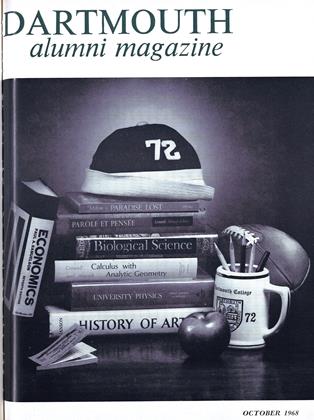WITH the opening of the academic year Dartmouth College launched a new agency for direct communication among undergraduates, Trustees, faculty, administrative officers, and President Dickey, to examine matters of common interest about the College.
This forum, known as the Dartmouth Campus Conference, had its formal beginning at an organizational meeting September 22, led by its chairman, Trustee F. William Andres '29 of Boston. It was publicly announced by President Dickey in his Convocation address the following morning.
President Dickey said at the Convocation that the Dartmouth Campus Conference was "being created to provide the principal constituencies of this campus with an organized, ongoing forum for knowing each other better to the end that they may be as close as possible to being one in both democracy and authority." He explained that the Conference would meet several times a year, "not as a super-authority for the campus, but as a continuing, organized collaboration of faculty, students, staff, Trustees, and president in the formulation and service of our institutional sense of purpose."
Two other Trustees serving as Conference members at this time are Charles J. Zimmerman '23 of Hartford, Conn., and Thomas W. Braden '40 of Oceanside, Calif. Student leaders participating are F. Samuel Faber '69, chairman of Palaeopitus; Robert F. Houser '69, president of the Interdormitory Council; Dimitris E. Gerakaris '69, president of the Interfraternity Council; and Rolf W. Kielman '70, president of Green Key.
Faculty representatives are Prof. John H. Copenhaver '46, chairman of the Faculty Committee on Organization and Policy; Prof. James W. Fernandez, chairman of the Faculty Committee on Educational Planning; and Robert E. Huke '48, chairman of the Faculty Subcommittee on Agenda. Administrative representatives are Vice President and Treasurer John F. Meck '33, Provost Leonard M. Rieser '44, and Dean of the College Thaddeus Seymour. President Dickey is a member of the Conference, and Gilbert R. Tanis '38, Executive Officer of the College, serves as secretary.
The Conference will be financed by the Joel Benezet '66 Memorial Fund. For the past three years this fund has been used for an annual weekend retreat at which a dozen or so sophomores can meet and talk informally with President Dickey and a few faculty members and administrative officers.
Discussing the background that led to the establishment of the Dartmouth Campus Conference, President Dickey said that he had felt for some time "that the increasing turmoil in the academic world required all of us to reexamine our assumptions about the nature of an institution of higher learning and its management or government." In particular, he added, he was concerned with building into the life of the College "a better understanding on the part of all elements of their respective interests and roles in relation to each other."
Although the Conference will be the first formal, ongoing effort to bring Trustees into direct, periodic communication with students as well as faculty and staff, Dartmouth has already responded to student interest in sharing in the decisionmaking processes by giving student leaders membership on some key faculty committees.
Last spring, for example, four students were added for an experimental period of one year to the Committee on Administration, which considers all major disciplinary cases and questions of academic standing. This was a continuation of the pattern begun a year ago when three students were added to the Committee on Educational Planning, the faculty agency concerned with the long-range educational planning and innovation for the College.
Inclusion of students on these committees has been supplemented by the participation of undergraduates on several ad hoc committees such as the faculty-student committee which hammered out Dartmouth's important "Policy on Dissent," another committee which formulated the College's policy against drug use, and the Bicentennial Planning Committee.
In the context of the evolving role of student government at Dartmouth, President Dickey has noted a "basic need to review the status and structure of student government on campus," and has suggested that this area is one that the Dartmouth Campus Conference might want to study.
Trustee F. William Andres '29 (r), chairmanof the new Dartmouth Campus Conference,chatting with President Dickeyand Professor Emeritus Stearns Morse.
 View Full Issue
View Full Issue
More From This Issue
-
 Feature
FeatureTwo Societies, Separate and Unequal
October 1968 By CHARLES F. DEY '52 -
 Feature
FeatureJOHN THORNTON OF CLAPHAM
October 1968 By FRANK W. FETTER -
 Article
ArticleThe Faculty
October 1968 By WILLIAM R. MEYER -
 Article
ArticleWith the Big Green Teams
October 1968 -
 Class Notes
Class Notes1912
October 1968 By DR. STANLEY B. WELD, FLETCHER CLARK JR. -
 Class Notes
Class Notes1921
October 1968 By JOHN HURD, INGHAM C. BAKER







